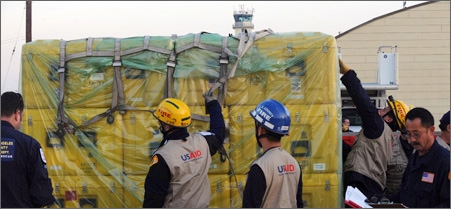|

by Bob Brewin
January 15, 2010
from
Nextgov Website

Workers load an Air
Force jet
with supplies and
equipment at March Air Reserve Base in California.
As personnel representing hundreds of
government and non-government agencies from around the world rush to
the aid of earthquake-devastated Haiti, the Defense Information
Systems Agency (DISA)
has launched a Web portal with multiple social networking tools to
aid in coordinating their efforts.
On Monday [January 11, 2010], Jean Demay, DISA's
technical manager for the agency's Transnational Information Sharing
Cooperation project, happened to be at the headquarters of the U.S.
Southern Command in Miami preparing for a test of the system in a
scenario that involved providing relief to Haiti in the wake of a
hurricane. After the earthquake hit on Tuesday, Demay said SOUTHCOM
decided to go live with the system.
On Wednesday, DISA opened up its
All Partners Access Network,
supported by the Transnational Information Sharing Cooperation
project, to any organization supporting Haiti relief efforts.
The information sharing project, developed with backing from both
SOUTHCOM and the Defense Department's European Command, has been in
development for three years. It is designed to facilitate
multilateral collaboration between federal and nongovernmental
agencies.
Demay said that since DISA set up a Haiti Humanitarian Assistance
and Disaster Relief Community of Interest on APAN on
Wednesday, almost 500 organizations and individuals have joined,
including a range of Defense units and various nongovernmental
organizations and relief groups.
APAN provides a series of
collaboration tools, including
geographical information systems, wikis, YouTube and MySpace-like
pages and multilingual chat rooms.
Meanwhile, other organizations are tackling different technological
challenges. Gianluca Bruni, the Dubai-based information
technology chief for emergency preparedness and response for the
World Food Program (WFP), is setting up networks and systems to
support United Nations and nongovernmental organizations in Haiti.
WFP already has dispatched two
communications kits to Haiti, with satellite systems that operate at
1 megabit per second and can support up to 100 users. It also has
sent laptop computers, Wi-Fi access points and long-range
point-to-point wireless systems to connect remote users to the
satellite terminals. Bruni said eventually WFP plans to set up cyber
cafés in Haiti for use all relief workers in the country.
Jon Anderson, a DISA spokesman, said the agency is supplying
10 megabits of satellite capacity to Navy, Marine and Air Force
units engaged in the Haiti relief operation.
Many of the relief organizations and agencies in Haiti are bringing
their own radio systems to the country. DISA has deployed a
three-person team from its Joint Spectrum Management Element to help
manage radio frequency spectrum.
The Joint Forces Command's
Joint Communications Support Element
deployed two teams equipped with satellite systems and VoIP phones
to support SOUTCOM in Port-au-Prince late Wednesday.
Those systems were operational "in a
matter of hours," said JCSE Chief of Staff Chris Wilson.
The organization will send another team
to Haiti in the next few days.
Wilson said JCSE was able to get its gear into Haiti quickly because
the systems already were loaded on pallets in Miami in preparation
for an exercise that has been canceled.
So many governments and agencies from around the world have
responded to the crisis in Haiti that they have overwhelmed the
ability of the Port-au-Prince airport to handle incoming relief
flights. The Federal Aviation Administration has had a ground-stop
on aircraft headed for Haiti for much of the past two days.
FAA warned in
an advisory Friday that,
"due to limited ramp space at
Port-au-Prince airport," with the exception of international
cargo flights, "the Haitians are not accepting any aircraft into
their airspace."
The advisory added that domestic U.S.
military and civilian flights to Haiti must be first be cleared by
its command center. Exemptions will be based solely on the basis of
ramp space.
The agency also starkly warned "there is
no available fuel" at the Port-au-Prince airport.
|

